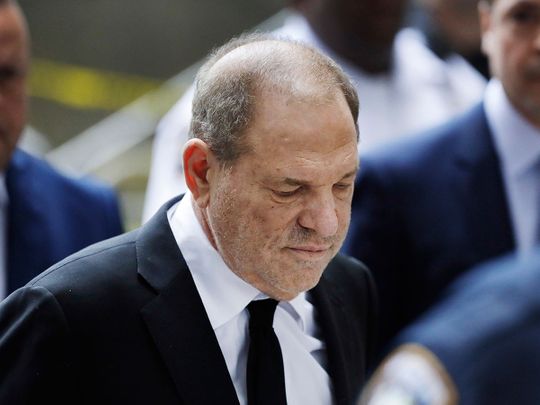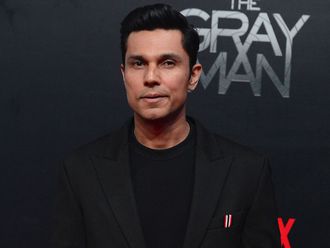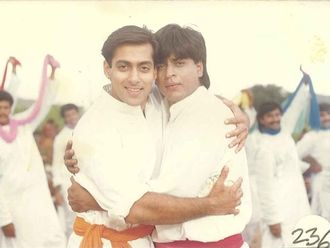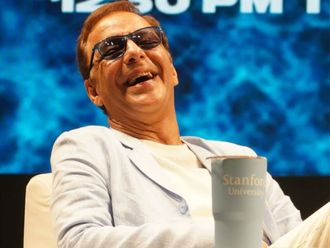
New York: Harvey Weinstein was convicted of rape and a criminal sexual act in New York, more than two years after allegations against the Hollywood power broker sparked the #MeToo movement.
Weinstein, 67, could spend years in prison, a remarkable fall for a man once celebrated and feared in the film industry. The former movie mogul was acquitted of the most serious charge, predatory sexual assault, and a count of rape in the first degree.
A Manhattan judge has ordered Weinstein to remain in custody until his sentencing, scheduled for March 11, on a guilty conviction for sexual assault and rape.
Judge James Burke denied a defense request that the disgraced film producer remain out on bail for health reasons, but said he would ask that Weinstein be held in an infirmary unit.
Weinstein's defence attorney has said the producer will appeal convictions. "We absolutely will be appealing. The fight is not over," Donna Rotunno said after a jury of 12 found Weinstein guilty of sexual assault and rape but cleared him on the most serious predatory charges.
The trial marked an extraordinary moment in a national reckoning over the abuse and assault of women in the workplace. Much has changed since the New York Times and the New Yorker reported in late 2017 that dozens of women had accused Weinstein of preying on them, unleashing similar claims against other powerful men. The crisis consultancy Temin & Co. puts the current number of Weinstein accusers at 111.
The verdict is "a strong message sent to survivors about the prospects of justice," said Deborah Tuerkheimer, who prosecuted sex crimes and domestic violence cases in the Manhattan district attorney's office, which handled the Weinstein case.
It could encourage more victims of sexual assault to pursue that justice in the courtroom. Rape is notoriously underreported, partly because victims fear they won't be believed and will be retraumatised.
But Weinstein's conviction "should not be viewed as a statement for or against a movement," said Laura Brevetti, a former federal prosecutor in Brooklyn who has defended clients accused of sex crimes. Instead, she said, it is "a clear vindication of the goal that so many have tried to achieve for decades - that a person who has been sexually abused by anyone, especially someone in a position of power or authority, should not remain silent about it, that a victim has the right and channel to report it, and that our judicial system can ultimately bring justice to a victim."
Weinstein, who never took the witness stand himself, had been on trial in Manhattan since Jan. 6, charged with forcing oral sex on "Project Runway" assistant Miriam Haley in his SoHo loft in 2006 and raping aspiring actor Jessica Mann in a midtown Manhattan hotel in 2013. Prosecutors for Manhattan District Attorney Cyrus Vance Jr. called several additional witnesses to establish a pattern of predation, including the actor Annabella Sciorra, whose searing account of an assault in her Gramercy Park apartment a quarter century ago was among the trial's unforgettable moments.
Weinstein's lawyers came back at them by poking holes in their witnesses' testimony, invoking affectionate emails and sustained relationships with Weinstein long past the alleged attacks, to paint a picture of consensual sex with mutual benefits. It was the women who were using Weinstein, they told the jury.
In the end, Weinstein's attorney Donna Rotunno and her team couldn't persuade the jury of seven men and five women that the encounters with Haley and Mann were at worst transactional and that the woman is responsible for what happens to her - a go-to defense in sexual assault trials that's riskier in the #MeToo era.
Lead prosecutor Joan Illuzzi and her colleague Meghan Hast prevailed by arguing that Weinstein was a serial predator who lured victims, hungry for success and vulnerable, into his orbit with promises of mentorship or career-making roles and subjected them to a series of "tests" to see how much he could get away with.
Weinstein still faces sexual assault charges in Los Angeles. They were announced the day his New York trial started.
#MeToo advocates stress that the movement is about more than the Weinstein trial.
"These really brave women have unleashed something that is bigger than anything we could have ever predicted," said Fatima Goss Graves, the president and chief executive officer of the National Women's Law Center.
Since the allegations against Weinstein were first widely reported, some 1,400 powerful people have been publicly accused of harassment, abuse or assault, according to Temin, the crisis consultants. Many suffered professional consequences of one kind or another. Workplaces have bolstered their sexual harassment policies. Some of the biggest companies, including Alphabet Inc.'s Google and Wells Fargo & Co., have dropped forced-arbitration clauses for harassment complaints from employment contracts. More than a dozen states have amended or updated workplace harassment laws.
"That public conversation and transformation is much bigger than any one person, even someone who is as powerful as Harvey Weinstein," Goss Graves said.
The case against Weinstein hinged on whether the panel believed Mann and Haley, who went years without reporting the alleged attacks. Weinstein's lawyers suggested through questioning that the women had "re-labeled" consensual encounters as assaults long after the fact, in the wake of the news reports that set off #MeToo. They pointed to evidence that Mann may have continued to have sexual encounters with Weinstein into late 2016, more than three years after the alleged rape - a behavior typical of victims, according to a forensic psychiatrist who testified for the prosecution.
"Sopranos" star Sciorra was the first accuser to take the stand, testifying that she weighed a little over a hundred pounds in the 1990s and Weinstein well over 200. She told the jurors that he pushed his way into her apartment one night in the winter of 1993-94 and overpowered her, pinning her hands above her head and raping her. When she confronted him a month later, she told the panel, he scoffed at the idea that the encounter wasn't consensual.
"That's what all the nice Catholic girls say," Sciorra said he told her. She testified that he then warned her never to discuss the incident.
"His eyes went black," Sciorra said, "and I thought he was going to hit me right there."







